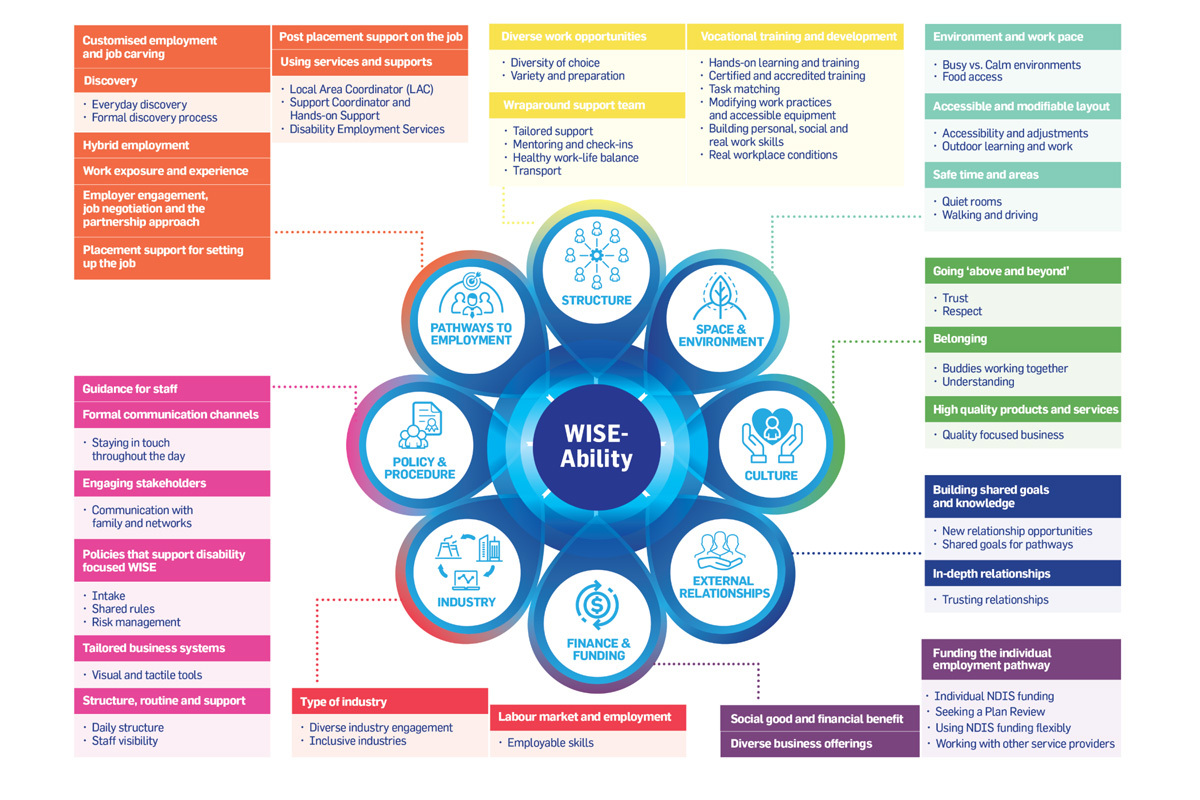Connecting Pathways to Employment with the Work Integration Social Enterprise (WISE) Model

In Australia, Australian Disability Enterprises (ADEs) primarily employ people with intellectual disability, Down syndrome and Autism, as well as others with diverse disability.
Until recently, the Australian employment system has excluded people who are able to work less than 8 hours per week from most employment services, meaning that ADEs have been the main employment option for them.
The WISE-Ability model supports ADEs to transform so that they can better support this group into inclusive and diverse employment.
What is the WISE-Ability Model?
Through collaborative research with four ADEs and their supported employees, we have built an organisational model (the WISE-Ability model) that can be used to transform ADEs. The model focuses attention on key organisational elements to foster inclusive employment opportunities.
Most significantly it adds a ‘pathways to employment’ focus which shifts practice to support participants to gain employment outside the ADE.
The model is aligned to NDIS funding and highlights practices and organisational design across eight major areas such as Policy and Procedure, Culture, Relationships, Environment, that are necessary to establish a work integration social enterprise approach that is inclusive and fosters diverse employment opportunities inside and outside of the organisation.
A training resource has been developed with four organisations, and information and guidance made available through webinars, website, and presentations to the supported employment sector.

Key findings
Building on research published in July 2022, the WISE-Ability model has been tested in four ADEs and has had a range of impacts including:
- 19 supported employees have been supported to identify and/or obtain a pathway to employment outside the ADE
- One supported employee notes that this work offers more than financial rewards: ‘the pride motivates me. And receiving good feedback from the people who are working for me or are working with me’. These employees did not have this opportunity previously.
- Participating ADEs and staff have identified that this has changed their attitudes toward the role of ADEs
- Research to inform the model has been used to influence policy: The model has formed part of submissions to public inquiries including the Disability Royal Commission and the Review of the National Disability Insurance Scheme.
- The model has been proposed for adoption by a further 6 ADEs who have successfully sought funding to adopt the model
This research was conducted in partnership with the Department of Social Services, Windarring , GenU , Ability Works , The Disability Trust .
Recommendations
- The pathway to employment differs for different individuals. While some people benefit from intensive and sustained supports, other people benefit from decreasing supports on the job and building independence
- Employer investment, work environment and pace are important factors in determining the sustainability of the employment position and the wellbeing of the employee
- Most Disability Enterprises are spending a significant amount of time in the early phase of the employment pathway, including discovery and assessment /paperwork for Participants in the first place
- There is a large variation across partners in the cost for an employment pathway as some involve more intensive supports, while others involve light supports
- Protracted transitions: Participants who felt marginalised from employment opportunities or who were waiting for employment experienced a negative impact on their mental health
Explainer video: 2024
Explainer video: 2022
Project Background
In 2021 Centre for Social Impact Swinburne and genU's Disability Support Services were funded by the Department of Social Services to adapt and implement elements of the Work Integration Social Enterprise (WISE) model into a genU supported work environment, which supports inclusive workplace conditions and employment pathways for people with a disability.
The resulting report, launched in a webinar in July 2022, finds that the challenge in creating sustainable employment pathways for people with disability is shaped by employer confidence, employee confidence and having the right funding and organisational structure to support pathways.
The research team at CSI Swinburne then began working with partners to develop pathways for people with a disability into open employment settings. As part of this work the team hosted a webinar called 'Employment Pathways for People with a Disability: Lessons Learned from the US' on the 8th of December 2022. The webinar includes presentations from international pathways experts Sara Murphy and Rich Luecking.

